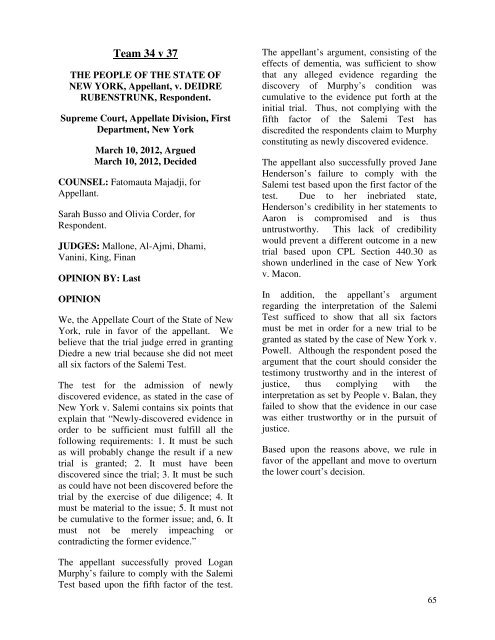2012 Conference Executive Record Report.pdf - YMCA of Greater ...
2012 Conference Executive Record Report.pdf - YMCA of Greater ...
2012 Conference Executive Record Report.pdf - YMCA of Greater ...
Create successful ePaper yourself
Turn your PDF publications into a flip-book with our unique Google optimized e-Paper software.
Team 34 v 37<br />
THE PEOPLE OF THE STATE OF<br />
NEW YORK, Appellant, v. DEIDRE<br />
RUBENSTRUNK, Respondent.<br />
Supreme Court, Appellate Division, First<br />
Department, New York<br />
March 10, <strong>2012</strong>, Argued<br />
March 10, <strong>2012</strong>, Decided<br />
COUNSEL: Fatomauta Majadji, for<br />
Appellant.<br />
Sarah Busso and Olivia Corder, for<br />
Respondent.<br />
JUDGES: Mallone, Al-Ajmi, Dhami,<br />
Vanini, King, Finan<br />
OPINION BY: Last<br />
OPINION<br />
We, the Appellate Court <strong>of</strong> the State <strong>of</strong> New<br />
York, rule in favor <strong>of</strong> the appellant. We<br />
believe that the trial judge erred in granting<br />
Diedre a new trial because she did not meet<br />
all six factors <strong>of</strong> the Salemi Test.<br />
The test for the admission <strong>of</strong> newly<br />
discovered evidence, as stated in the case <strong>of</strong><br />
New York v. Salemi contains six points that<br />
explain that “Newly-discovered evidence in<br />
order to be sufficient must fulfill all the<br />
following requirements: 1. It must be such<br />
as will probably change the result if a new<br />
trial is granted; 2. It must have been<br />
discovered since the trial; 3. It must be such<br />
as could have not been discovered before the<br />
trial by the exercise <strong>of</strong> due diligence; 4. It<br />
must be material to the issue; 5. It must not<br />
be cumulative to the former issue; and, 6. It<br />
must not be merely impeaching or<br />
contradicting the former evidence.”<br />
The appellant successfully proved Logan<br />
Murphy’s failure to comply with the Salemi<br />
Test based upon the fifth factor <strong>of</strong> the test.<br />
The appellant’s argument, consisting <strong>of</strong> the<br />
effects <strong>of</strong> dementia, was sufficient to show<br />
that any alleged evidence regarding the<br />
discovery <strong>of</strong> Murphy’s condition was<br />
cumulative to the evidence put forth at the<br />
initial trial. Thus, not complying with the<br />
fifth factor <strong>of</strong> the Salemi Test has<br />
discredited the respondents claim to Murphy<br />
constituting as newly discovered evidence.<br />
The appellant also successfully proved Jane<br />
Henderson’s failure to comply with the<br />
Salemi test based upon the first factor <strong>of</strong> the<br />
test. Due to her inebriated state,<br />
Henderson’s credibility in her statements to<br />
Aaron is compromised and is thus<br />
untrustworthy. This lack <strong>of</strong> credibility<br />
would prevent a different outcome in a new<br />
trial based upon CPL Section 440.30 as<br />
shown underlined in the case <strong>of</strong> New York<br />
v. Macon.<br />
In addition, the appellant’s argument<br />
regarding the interpretation <strong>of</strong> the Salemi<br />
Test sufficed to show that all six factors<br />
must be met in order for a new trial to be<br />
granted as stated by the case <strong>of</strong> New York v.<br />
Powell. Although the respondent posed the<br />
argument that the court should consider the<br />
testimony trustworthy and in the interest <strong>of</strong><br />
justice, thus complying with the<br />
interpretation as set by People v. Balan, they<br />
failed to show that the evidence in our case<br />
was either trustworthy or in the pursuit <strong>of</strong><br />
justice.<br />
Based upon the reasons above, we rule in<br />
favor <strong>of</strong> the appellant and move to overturn<br />
the lower court’s decision.<br />
65
















